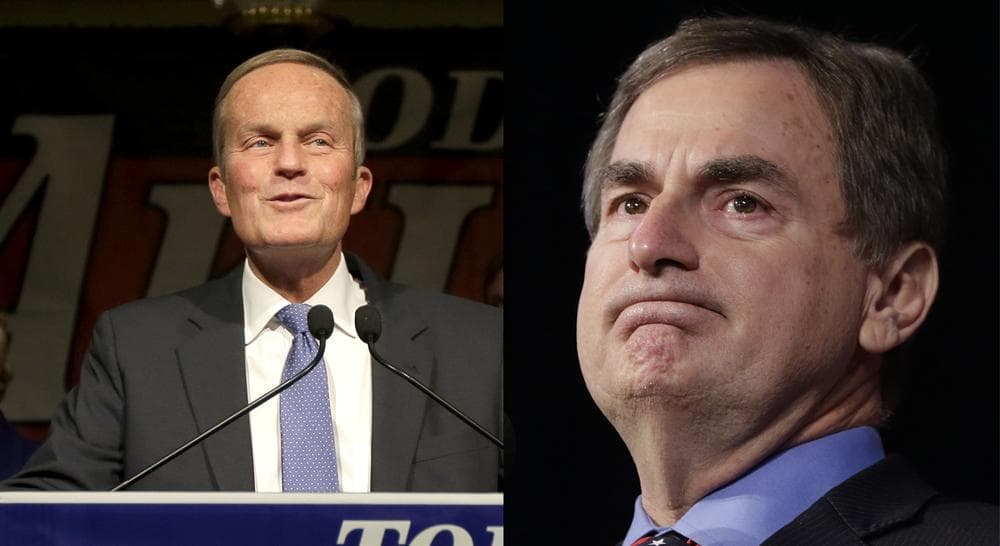Advertisement
Best Of Cog: Religion, Politics And America
Like so many across the nation, religious groups are assessing the impact and the message of the 2012 election.

In Maryland, Maine and Washington, voters approved ballot initiatives legalizing same-sex marriage. And in reliably red Missouri and Indiana, voters decisively rejected anti-abortion candidates Todd Akin and Richard Mourdock.
So what does this say about the impact and influence of traditional religious values on American politics?
In his Nov. 8, 2012 piece, Harvard University's humanist chaplain Greg Epstein had some cautionary advice:
Future candidates, take note: If you’re a religiously motivated politician, that’s fine, but wear religious blinders at your electoral peril. The nonreligious are now one of the largest demographic groups in the U.S., and numerous polls and studies have shown that a majority of young Americans are moving away from conservative religious values.
...
As this election proves, community is more important than ideology — and unity is more important than wedge politics. If humanists and the nonreligious take this to heart, we may advance our values in the years ahead.
A few days after the election, Epstein joined WBUR's Radio Boston. Listen to his conversation with co-host Anthony Brooks below:
Response to the piece and to the ideas in the piece, says Epstein in an author's update, has been "tremendous":
Shortly after it came out, I was invited to work with former Secretary of State Madeleine Albright and Harvard professor and CNN political analyst David Gergen on "The Inclusive America Project," based out of the Aspen Institute. The Institute, which prides itself on being one of the greatest conveners of important discussions in American civic and cultural life, is working to try to figure out the theory and practice of how religious communities ought to engage with one another in America today.
Of course, this is the sort of discussion that's been going on, well, since the days of the founding fathers. But one thing that gives me real hope is that this initiative has chosen to take very seriously the fact that 20 percent of the country, and 35 percent of American young adults, identify as nonreligious. Secretary Albright, the folks at Aspen, and the White House understand that in this day and age it is toxic to promote policies that actively discriminate against — or even just passively exclude — Humanists and the nonreligious.
It's just that most political leaders and institutions in America generally assume they lack allies among secularists and nonreligious people who can contribute helpfully to U.S. civic society, comparable to the way churches and other big religious institutions do. Big Religion not only brings votes, it also represents community and all the good things that communities do for Americans, say, at times of tragedy.
We're launching a new think tank that will promote the development of civically engaged — and politically influential — communities of Humanists, atheists, and the nonreligious nationwide. Check that out here, and I'll look forward to discussing it with WBUR readers and listeners in 2013.
-- G.E. 12/18/12
As with any hot-button issue, Epstein's article elicited a lot of response on our website, as well as on Twitter and Facebook.
Some people sounded off on what it will take for the religious right to remain viable:
Ann Marie: It's not what they say or believe that gets them in trouble but that they want to make these beliefs the law of the land. To your broader point, organized religion is not the only repository for those who sustain a spiritual life — more and more are doing so outside the walls of churches and synagogues.
Jasoturner: One thing that people can't seem to wrap their heads around is that morality is not derived from religion or religious faith. And this seems to be the primary issue that religious believers cannot entertain. This is too bad, because they might find more common ground with atheists if they thought this through.
Other readers pushed back on Epstein's notion that there had been a sea change:
PS: There are numerous others that have pretty much the same view and are still getting elected. For instance, Paul Ryan holds the same view but he escaped unscathed. In fact, Paul Ryan co-sponsored a bill that talks about "forcible" rape. Michelle Bachmann has pretty much the same attitude. These two, Akin and Murdoch, lost because, for whatever reason, they bore the brunt of the wrath. And it might have nothing to do with how many religious blinders they wear.
Jack: Joe Donnolly, who beat Mourdock, is also pro-life. He was enthusiastically supported by groups like Democrats for Life of America. There are plenty of progressive pro-life atheists out there, including myself, and I gladly sent money from Boston to pro-life Democrats across the country.
You can read the original piece here.
This program aired on December 21, 2012. The audio for this program is not available.